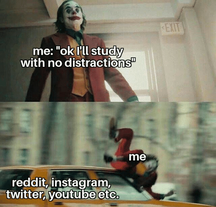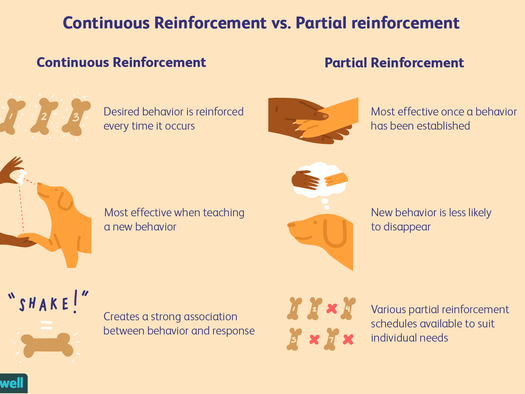Motivation is important, but discipline is more so ;) Stay on track using these strategies, tried and tested by your own resident ADHDer (with resources, videos and madlibs).
1. The Ulysses Pact: a friend holds your money hostage.
2. Positive Reinforcement: not just for dogs and kids.
3. Streamline: plan your week.
4. The One With The Red Crosses: maintain a streak.
5. Plan For Fuckups: this one doesn't need a tagline...
6. Two strategies that might not work for ADHDers... but they look so good.

It got me thinking about methods of motivation, how the normal ones are simply disappointing for my "I know you'll eat the cookie even if we don't do the thing" brain and so, dear readers, I have returned to share with you the bounty of my research...
How can I motivate myself?
First of all, let's quickly consider a sub-question "what is motivation?". Motivation, in my opinion, is the drive and will to actually MAKE changes. It's what came to me one day when I was sitting at the table, tired, overweight and over-eating yet again. It's what rears its head every New Year's Day when we choose to do a billion things to improve ourselves. It's the thing that eagerly has us signing up for gyms, weight loss websites and new workout clothes (that last one isn't true. Workout clothes are awesome either way).
With that said, I feel at this point that it's important to separate motivation and discipline. It's not possible to be motivated 100% of the time, so at some point, we have to "fake it" using habits, rewards, sweet talk or straight up coercion which can be a "challenge" for the exectutively-functioning-impaired such as myself.
There are some pretty universally accepted methods of becoming (and staying) motivated to do something; social support, knowing your "why", pomodoro (and other timing) techniques, clearly setting your goals (using SMART goals) amongst lots of generic and simple ways to motivate ourselves, but it got me thinking - if motivation is so easy, why the hell is it so hard? Ok, so my brain might be akin to a particularly capricous 3 year old, who's just discovered that mum's makeup makes great finger paint at the same time mum has come to summon her to go and eat her greens and NOT spread "ruby red" lipstick over everything, but it shouldn't be *this* hard... should it?
Yes, and no. Being an ADHD brain doesn't make this stuff any easier, ironically enough, attention isn't the issue... but executive processing (the brain being able to tell everything what to do and when, using a system of priorities(1)) definitely is (2), and that's what presents the problem for most people. Us neurodivergents especially.
So... how can we get that ol' grey matter to play ball? Generally, if it doesn't catch my attention or reward me with some sweet sweet dopamine, it will quickly be abandoned (and on I go to my next hyperfixation). How can I motivate myself?
Sit back and relax, with my summary of my favourite methods!
1. The Ulysses Pact
Explanation

Likewise, this technique uses a pact, with a resulting reward/punishment, with another person to keep you true to your goals.
How To Do It
You might agree to go to the gym with your friend every week. You could write a series of cheques for £25 and order them to cash one in for every session you miss.
Pros and Cons
- its requires another person's help!
2. Positive Reinforcement
Explanation
 Image from https://www.incentivesolutions.com/big-bang-theory-right-rewards/
Image from https://www.incentivesolutions.com/big-bang-theory-right-rewards/ *teacher voice here*
plese note, Sheldon uses the term negative reinforcement (reward via the removal of a negative stimulus) incorrectly, as using electric shocks would be considered punishment (the introduction of a negative stimulus).
| | So, you can see the idea. This is a technique used to help kids learn behaviours, and to train dogs to understand commands. It's effective - positive reinforcement on a continuous, fixed schedule (so every correct action is rewarded), is the most effective (short term) way of making sure a behaviour is learnt. Buuuut, it's short term - in the long term, brains |
How To Do It
Well, for a new behaviour it would be something like:
1. choose an action (work out for 5 minutes)
2. reward self for action - ask someone to praise you until you blush every time you complete this action (other options: food is usually the go to here, but that can lead to unhealthy relationships with food so something like playing your favourite video game).
For an already learnt behaviour:
1. choose the action (e.g. go to the gym)
2a. variable interval rewards (e.g. for every - 2 workouts, 1 workout, 4 workouts - go for a spa day/buy a new piece of clothing/read a new book etc).
+ seen to be more effective/less extinction of behaviour
- more difficult to organise yourself
2b. (my preferred, but less effective generally) fixed interval rewards (e.g. for every 3 workouts you do, you get to buy a new item of clothing, or a new game, or take a trip or play in the mud... etc...)
+ easier to organise than 2a
- less effective than 2a
If you ever want me to do something again, your best bet is to praise the hell out of me ...
Pros and Cons
- can be difficult to find rewards that are substantial enough (here's where social support can come in handy)
3. Streamline
Explanation

Reasoning behind this...
This technique comes back to a psychological memory aide called chunking - the original techniques were developed as a mnemonic strategy to help people remember things (after psychologists realised that our working memory has an upper capacity - once thought to be 7 (+/- 2) items, but is now generally regarded as 4 (3)). In the mnemonic, long strings would be broken into smaller bits so that they could be remembered - 234 231 23 12 is easier to remember than 2342312312 for example. We can apply this idea outside of memory though, and break tasks into their component actions.
How To Do It:
1. Set aside a few minutes at the beginning of the week and decide when you'll workout, and what you'll do.
2. Make a list of everything you're going to need for your workouts that week, and put them together in an easily accessible place.
3. If you're super organised, have separate gym bags with the essentials (towel, water bottle, headphones, change of clothes) lined up and ready to go.
Running low on time or energy?
Keep a workout journal with simple, quick workouts (or use an app such as Freeletics)
Pros and Cons
- can be a bit overwhelming, needs planning
4. The One With Big Red Crosses
Explanation
| "He told me to get a big wall calendar that has a whole year on one page and hang it on a prominent wall. The next step was to get a big red magic marker. He said for each day that I do my task of writing, I get to put a big red X over that day. “After a few days, you’ll have a chain. Just keep at it and the chain will grow longer every day. You’ll like seeing that chain, especially when you get a few weeks under your belt. Your only job next is to not break the chain.” “Don’t break the chain,” he said again for emphasis" - Brad Isaac |

Positive reinforcement from the big, red Xs that reward you with a sense of satisfaction.
Negative reinforcement from "relieving" the pain of missing a day.
It's also great, as it's a calendar full of big red (or whatever colour) Xs which is a fantastic visual reminder to do your chosen task!
What You'll Need:
Or (eco version) download a streak app with a very visual widget.
How To Do It:
2. Every day you complete the task, mark it off with a NICE BIG X (I also like to use "ticks") in whichever colour you like. Red is nice and obvious!
3. Keep your streak alive as long as you can! When/if you miss a day, note down how long your streak was in that day's box and use that as your next goal to beat!
(You can find apps, such as HabitBull that do this - although I find if it's out of sight, it's definitely out of mind!).
Pros and Cons
- (in my experience) it can be very demotivating if you've missed a day for a reason outside of your control.
5. Planning For Fuckups
Explanation

If people believe that "failing to plan, is planning to fail" I think it's not only a fallacy, but can be REALLY detrimental to mental health. As an ADHDer, then number of times I've "messed up" has been astounding. What's worse is being punished for these "failures". It took me until I was in my late twenties to realise, and then until my thirties to accept that actually, sometimes we do "fuck up" and that's ok too. We learn from it and it gives us additional information of past errors so we can better inform our future choices.
So, plan for it. Give yourself some wiggle room.
How To Do It
2. Decide what "slipping up" might look like (e.g. I didn't go to my planned gym session or I ordered a pizza, 3 beers, two chocolate cakes and my weight's worth of ice-cream and then ate it in one go).
3. What will you do when you "slip up"?
Here are some ideas of how to handle "messing up":
1. Talk to a friend to stay accountable. Be explicit with this person about what things will be helpful to say to you in this situation ahead of time).
2. Speak gently to yourself. One rule of thumb I like to use is: would you speak to a little kid, or your dog like that? Would you speak to your friends or loved ones like that? If the answer is no... why is it ok to be that way with yourself? Imagine yourself as a child, speak gently, explaining the problem and the way in which you'd like to proceed.
3. Document the situation. What happened beforehand? What did you do? How did you feel? If it keeps happening, look back on this information to help you understand patterns. If something isn't working, it's better to understand how to fix it rather than berating it for not being right (except printers. Printers can go to hell). Be mechanical, not moral here.
Pros and cons
- Can be difficult to apply in the beginning. LEarning to be gentle after years of being told to be harsh is a steep learning curve.
Two strategies that are appealing, but might not be great for ADHDers/other neurodivergents
A. Productive Procrastination
 theoatmeal.com
theoatmeal.com This SEEMS like a good idea, but if you have issues transitioning from task to task as I do (which you likely do if you're neurodivergent) it can just lead to effective procrastination. Which isn't the same thing!
Anyway, let me summarise the idea.
Since procrastination is normal, even in neurotypical people, Nick suggests building in some "free" time before your target activity. Want to go to the gym? Well, build in 10 minutes of scrolling through Facebook mindlessly before you leave. Want to go for a run? Organise 5 minutes of staring absent mindedly at the TV before preparing yourself (see... it spells danger! 😂)
B. The Distractions List

Set a timer for 30 minutes, in that 30 minutes do your target task ONLY but keep a "distractions list" close by. Every time you get distracted by something, write down your thought so that you can follow it up when you've finished.
So, for example, if you're working out at home, every time you want to go and do something else before you forget about it, jot it down.
I love this idea in theory and use it to not forget things while I'm out walking the dog (Google notes), but if at home it could (and can) lead to being distracted by your distractions list.
If you want to give it a go, you can find an example and a template here.
Overall
- Don't berate yourself. You're great as you are, what's better is, you're learning all the time - so you're only going to get better!
- If you keep having the same issues, try to adjust your plans. Take note of what's happening. Maybe you just DON'T LIKE going to the gym, that's ok, there's a million and one ways to get exercise.
- Plan so that you're not overly challenged, but you're also not under challenged. Find your sweet spot (think of Goldilocks trying to find the right sized bed!).
- BE KIND TO YOURSELF.
Quiz
References
1. https://www.understood.org/articles/en/what-is-executive-function
2. Swanson J. M. (2003). Role of executive function in ADHD. The Journal of clinical psychiatry, 64 Suppl 14, 35–39. https://pubmed.ncbi.nlm.nih.gov/14658934/
3. https://www.pnas.org/content/113/27/7459
https://jamesclear.com/motivation
https://nickwignall.com/stay-motivated/
https://foundrybc.ca/stories/5-tips-staying-motivated-even-youre-really-not-feeling/
https://medium.com/swlh/the-beginners-13-step-guide-to-motivation-3f5a62110b6b
https://www.inc.com/lolly-daskal/19-simple-ways-to-stay-motivated-that-actually-work.html
https://www.verywellmind.com/what-is-a-schedule-of-reinforcement-2794864










 RSS Feed
RSS Feed
